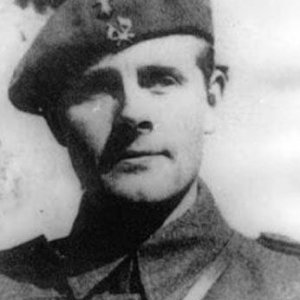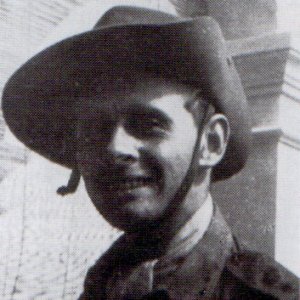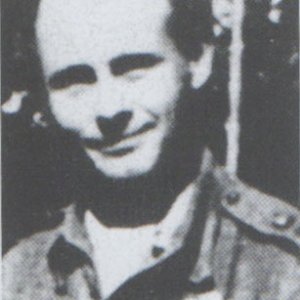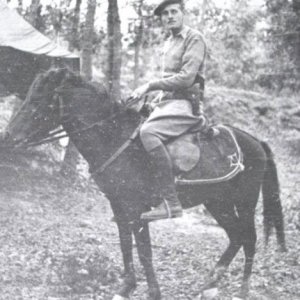- SURNAME
Kemp
- FORENAME
Peter Mant MacIntyre
- UNIT
Force 136 SOE
- RANK
T/Major
- NUMBER
107025
- AWARD
Distinguished Service Order, Mention in Despatches
- PLACE
Burma 1945
- ADDITIONAL INFORMATION
parent unit Intelligence Corps
born 19.8.1915 Bombay, India
son Sir Norman Wright Kemp
MI (R) 1940
62 Commando (Small Scale Raiding Force)
SOE Albania 1943
SOE Mission Freston (Poland) 1944
Force 136 1945
postwar SIS
died 30.10.1993, London, UK (Aged 80)
Peter Mant MacIntyre Kemp, soldier and writer: born Bombay 19 August 1915; MC 1941; DSO 1945; twice married (marriages dissolved); died London 30 October 1993.
PETER KEMP was a distinguished irregular soldier during the Second World War, and long retained his nose for trouble spots thereafter.
His father was a judge in Bombay, where he was born. After conventional education at Wellington and Trinity, Cambridge, he started to read for the Bar, but was called away by the outbreak of civil war in Spain. Already alarmed at the menace of Communism, he joined a Carlist unit in General Franco's forces in November 1936 and later transferred to the Spanish Foreign Legion in which - rare distinction for a non-Spaniard - he commanded a platoon. He was several times wounded, but stayed at duty till a mortar bomb broke his jaw in the summer of 1938.
He had barely recovered from this wound when a chance meeting with (Sir) Douglas Dodds-Parker brought him into MIR, a small research department of the War Office which was one of the starting components of the wartime Special Operations Executive. MIR sent him on an abortive expedition to Norway by submarine. He was one of the earliest pupils at the Combined Operations Training School at Lochailort on the shores of the Western Highlands; sailed in intense discomfort to Gibraltar in the hold of that dubious craft HMS Fidelity; and went on another abortive submarine voyage in pursuit of a German U-boat. This aborted because a British destroyer attacked the submarine carrying Kemp by mistake. The operation SOE had planned for him in Spain was cancelled. He returned to the United Kingdom for further training in parachuting sabotage and undercover tactics.
With a small-scale raiding force he took part in a few cross-channel commando raids, including a successful one which captured all seven of the crew of the Casquets lighthouse (one of them still wearing a hair-net). When the force closed down after its leader's death in action he went out to Cairo, and was absorbed into SOE's Albanian section. He spent 10 months clandestinely in Albania, many of them in disagreeable proximity to Enver Hoxha, the Communist leader. He had several close brushes with death, and found the complexities of Balkan politics intensely confusing in a many-sided war. Eventually he walked out into Montenegro, across the border with Yugoslavia, and was safely brought back to Cairo.
He did one more mission for SOE in Europe, into southern Poland at the end of 1944, in a party commanded by Colonel DT Hudson, who had been a leading SOE agent in Yugoslavia. Their Polish friends protected them from capture by the Germans. They were then overrun by the Red Army, and imprisoned in odious conditions for three weeks by the NKVD. Two months hanging about in Moscow waiting for an exit visa followed.
He had still not had enough fighting. He parachuted once more, in the summer of 1945, into Siam and ran arms to the French across the border with Laos - again fighting a polygonal war, for both the Japanese and the Viet Min tried to stop him.
Tuberculosis forced his retirement from the Army, and his health thereafter was always precarious. His energies remained enormous. He sold life insurance policies for a living, and wrote some excellent books. One, Mine Were of Trouble (1957) described his part in the war in Spain, and No Colours or Crest (1958), his life with MIR and SOE. These were strong, spare narratives, in beautifully clear English, extremely readable then and since. He acknowledged many of his own mistakes and never said a word of his calm, gentle, unfailing courage.
He went to Hungary during the rising in 1956, nominally as the Tablet's correspondent, and helped some students escape to Austria. He was present during the troubles in the Congo that led to its independence as Zaire; he fought intermittently in Vietnam; he visited and reported on revolutions in Central and in South America; he could even bear to revisit Albania, where he predicted further racial clashes between Albanians and Serbs. He was always ready to advise a friend; and in The Forms of Memory (1990) produced a notable autobiography. He bore his last illness with his usual fortitude.
Source : Independent.co.uk
CITATION:
Distinguished Service Order : Major KEMP was sent on a small clandestine operation to NORWAY in April 1940. The infiltration was to have taken place by submarine but on the outward journey the vessel was damaged by torpedoes from a U Boat and had to return to port and the operation was cancelled. In June, 1940 he was sent on an Intelligence mission to SPAIN and PORTUGAL from which he returned in September, 1940 having completed the work satisfactorily.
In February 1941 he volunteered for infiltration into SPAIN from GIBRALTAR for the purpose of harassing the expected German advance through SPAIN in order to attack GIBRALTAR. He returned to this country in August 1941 and stood by to be parachuted into Northern SPAIN until March, 1942.
From March, 1942 until May, 1943 he was attached to the Small Scale Raiding Force (No. 62 Commando). This Force had been formed to carry out small raids on German installations in NORMANDY, BRITTANY and the CHANNEL ISLANDS for the joint purpose of obtaining information and of undermining the morale of the German troops. Major KEMP took part in the raid on the CASQUETS when the entire garrison of the signal station was carried as prisoners. He also commanded the detachment in an attack on a strong point on the POINT de PLOUZEC (BRITTANY) when a number of Germans were killed without loss to the raiding party.
On 10th August, 1943 Major KEMP parachuted into ALBANIA as a member of an Allied Mission to the Partisan Forces. During this period he acted as Liaison Officer with the Partisan Provisional Government. He repeatedly exposed himself to great risk, notably on 21st August, when in conjunction with Albanian guerrillas, he attacked and shot up a large troop convoy in spite of heavy machine gun fire from the enemy. On 26th August he showed great gallantry throughout the day with the forward troops of the First Partisan Brigade, encouraging them to offer stubborn resistance to the advance of Italian troops which was supported by medium artillery, mortar fire and aircraft. In September, 1943 at the time of the Italian collapse Major KEMP was instructed to provide a clear account of the political situation in TIRANA. In spite of the fact that this officer speaks no Albanian he entered TIRANA on 22nd September, 1943 in civilian clothes and spent four days in the town. On 25th September whilst making a reconnaissance of TIRANA airfield he was stopped by a German patrol and showed great resourcefulness in evading arrest. He returned to his headquarters whence he transmitted most valuable intelligence by W/T to his Commanding Officer.
Throughout the winter of 1943/44 until his evacuation in March, 1944 Major KEMP continued to show great initiative and personal courage, and he took an active part in the fighting in the DEBRA area.
In February 1941 he volunteered for infiltration into SPAIN from GIBRALTAR for the purpose of harassing the expected German advance through SPAIN in order to attack GIBRALTAR. He returned to this country in August 1941 and stood by to be parachuted into Northern SPAIN until March, 1942.
From March, 1942 until May, 1943 he was attached to the Small Scale Raiding Force (No. 62 Commando). This Force had been formed to carry out small raids on German installations in NORMANDY, BRITTANY and the CHANNEL ISLANDS for the joint purpose of obtaining information and of undermining the morale of the German troops. Major KEMP took part in the raid on the CASQUETS when the entire garrison of the signal station was carried as prisoners. He also commanded the detachment in an attack on a strong point on the POINT de PLOUZEC (BRITTANY) when a number of Germans were killed without loss to the raiding party.
On 10th August, 1943 Major KEMP parachuted into ALBANIA as a member of an Allied Mission to the Partisan Forces. During this period he acted as Liaison Officer with the Partisan Provisional Government. He repeatedly exposed himself to great risk, notably on 21st August, when in conjunction with Albanian guerrillas, he attacked and shot up a large troop convoy in spite of heavy machine gun fire from the enemy. On 26th August he showed great gallantry throughout the day with the forward troops of the First Partisan Brigade, encouraging them to offer stubborn resistance to the advance of Italian troops which was supported by medium artillery, mortar fire and aircraft. In September, 1943 at the time of the Italian collapse Major KEMP was instructed to provide a clear account of the political situation in TIRANA. In spite of the fact that this officer speaks no Albanian he entered TIRANA on 22nd September, 1943 in civilian clothes and spent four days in the town. On 25th September whilst making a reconnaissance of TIRANA airfield he was stopped by a German patrol and showed great resourcefulness in evading arrest. He returned to his headquarters whence he transmitted most valuable intelligence by W/T to his Commanding Officer.
Throughout the winter of 1943/44 until his evacuation in March, 1944 Major KEMP continued to show great initiative and personal courage, and he took an active part in the fighting in the DEBRA area.
WEB LINKS:
https://www.iwm.org.uk/collections/item/object/80009553https://holdsworthtrust.org/those-that-served/kemp-peter-mant-macintyre/
https://www.commandoveterans.org/PeterKempSSRF
https://en.wikipedia.org/wiki/Peter_Kemp_(writer)
https://www.independent.co.uk/news/people/obituary-peter-kemp-1501984.html
NATIONAL ARCHIVES:
https://discovery.nationalarchives.gov.uk/details/r/D7396762 (DSO)
Last edited by a moderator:







